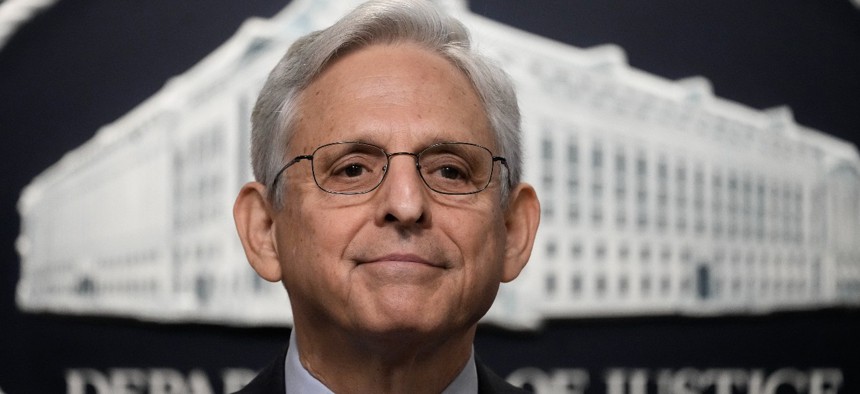
Attorney General Merrick Garland speaks during a news conference at the Justice Department on August 2. Drew Angerer/Getty Images
This is How DOJ Plans to Defend Feds Facing State Prosecution for Performing Abortions
The Biden administration has laid out its legal rationale to ensure federal employees are shielded from state laws banning the care.
The Biden administration has thrown its weight behind Veterans Affairs Department employees providing abortions, issuing a legal opinion to defend their authority to offer the care and vowing to defend them against any potential repercussions.
VA earlier this month began offering abortion services in cases of rape, incest or when the mother’s life is at risk, citing abortion restrictions going into place in states across the country to justify the change. The department initiated the change—which includes abortion counseling and limited access to abortions for veterans and beneficiaries who qualify for care from its network—through a rulemaking process, saying it has long held the authority to perform abortions even though it has not done so since at least 1989.
VA previously expressed confidence that its employees would be shielded from any punishments for carrying out their duties. Attorney General Merrick Garland said in June, following the Supreme Court’s overturning of Roe v. Wade, that federal employees who provide reproductive health services must be shielded from any repercussions for carrying out the duties of their jobs. The new opinion from the Justice Department’s Office of Legal Counsel detailed the legal theory underlying that perspective, adding additional weight to the administration’s position.
In its opinion, the Office of Legal Counsel noted that the Supremacy Clause of the Constitution "bars state officials from penalizing VA employees for performing their federal functions, whether through criminal prosecution, license revocation proceedings, or civil litigation." It highlighted several examples that upheld the precedent of "intergovernmental immunity," meaning the federal government is shielded from any state law that interferes with its operations.
“States’ attempts to restrict VA or its employees from providing such services would ‘regulate the United States directly,’ and therefore would be invalid absent any federal law consenting to the application of state law,” the counsel's office wrote in the opinion.
VA has full authority to determine the health care benefits its patients require, the office added, and it sufficiently proved that circumstances have made necessary its offering abortion services in limited circumstances.
“The rule is a lawful exercise of VA’s authority,” the Justice office said. “Moreover, states may not restrict VA and its employees acting within the scope of their federal authority from providing abortion services as authorized by federal law, including VA’s rule. States may not penalize VA employees for providing such services, whether through criminal prosecution, civil litigation, or license revocation proceedings.”
Some states may soon put that theory to the test.
Alabama Attorney General Steve Marshall, whose state has passed an abortion ban that does not provide for exemptions in cases of rape or incest, has suggested he would pursue prosecutions against even federal employee providers who violate the new law.
“I have no intention of abdicating my duty to enforce the Unborn Life Protection Act against any practitioner who unlawfully conducts abortions in the state of Alabama,” Marshall told the Alabama Political Reporter. “The power of states to protect unborn life is settled.”
Associate Attorney General Vanita Gupta told The Washington Post that Justice would represent any federal employees penalized for following their agencies' guidance to provide an abortion.
Last week, congressional Republicans blasted VA’s decision and requested more information on the department’s authority to implement the change. They argued that federal statute, as well as Supreme Court precedent in West Virginia v. Environmental Protection Agency, should have prevented VA from making the decision. In West Virginia, the Supreme Court established a legal theory known as the “major questions doctrine,” setting the precedent that agencies have little leeway in setting new regulations with major economic impact or political salience that rely on powers not clearly laid out in statutory text.
VA is “clearly violating the law, which has prohibited abortion at VA for 30 years,” said Rep. Mike Bost, R-Ill., ranking member of the House Veterans' Affairs Committee. “By using unelected bureaucrats to make policy decisions better left to duly elected representatives, VA is undercutting our constitutional process and the sanctity of life at the same time.”
VA Secretary Denis McDonough told the Senate Veterans' Affairs Committee last week the department has so far performed one abortion. He added the department had adjusted its services in the interest of patient safety and that the Supremacy Clause of the Constitution would protect VA employees performing their federal duties. On Monday, McDonough told reporters he was working closely with VA's internal police force to "take appropriate steps" to ensure veterans and providers at VA facilities were safe from any threats that could arise in the wake of its decision to provide abortion services.







